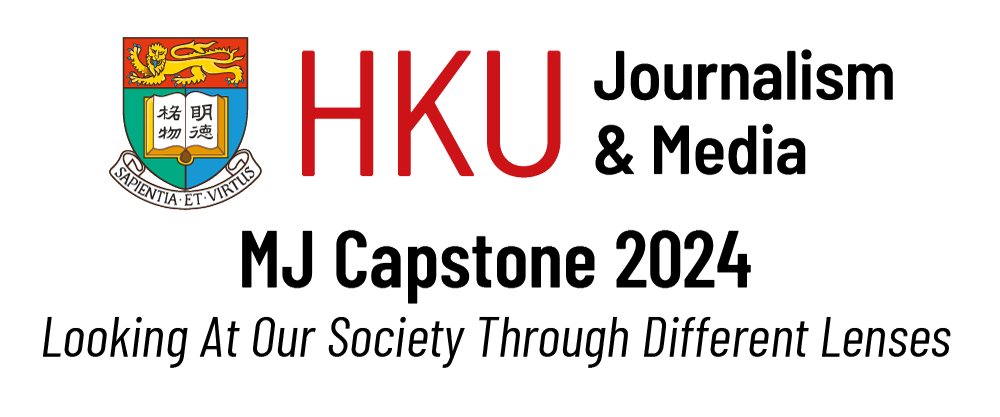In Hangzhou, China,
Deaf delivery drivers overcome many hurdles to get deliveries to customers’ doorsteps
At 10:20 a.m., Li had already arrived at the pickup point for his first delivery order for that day. As usual, he gestured the order number to the staff and then stood aside to look at his phone.
Shedding the initial awkwardness of working in his profession despite being deaf, he now navigates the silent world of deliveries with ease, swiftly completing each order.
After collecting the meal for a customer, Li mounted his electric bike and set off once more.
For delivery drivers, speed is everything because they will not earn any money for an order if they miss the promised delivery time.
However, their delivery addresses could be in any corner of the city, making it harder for them to find the destination accurately. Sometimes, even online navigation services can get confused. And going to the wrong place may lead to deliveries of all orders being late.
“At the beginning, he often got lost, but now, after so many years, he knows the routes well,” said He Guanyun, Li’s mother.
At 10:20 a.m., Li had already arrived at the pickup point for his first delivery order for that day. As usual, he gestured the order number to the staff and then stood aside to look at his phone.
Shedding the initial awkwardness of working in his profession despite being deaf, he now navigates the silent world of deliveries with ease, swiftly completing each order.
After collecting the meal for a customer, Li mounted his electric bike and set off once more.
For delivery drivers, speed is everything because they will not earn any money for an order if they miss the promised delivery time.
However, their delivery addresses could be in any corner of the city, making it harder for them to find the destination accurately. Sometimes, even online navigation services can get confused. And going to the wrong place may lead to deliveries of all orders being late.
“At the beginning, he often got lost, but now, after so many years, he knows the routes well,” said He Guanyun, Li’s mother.
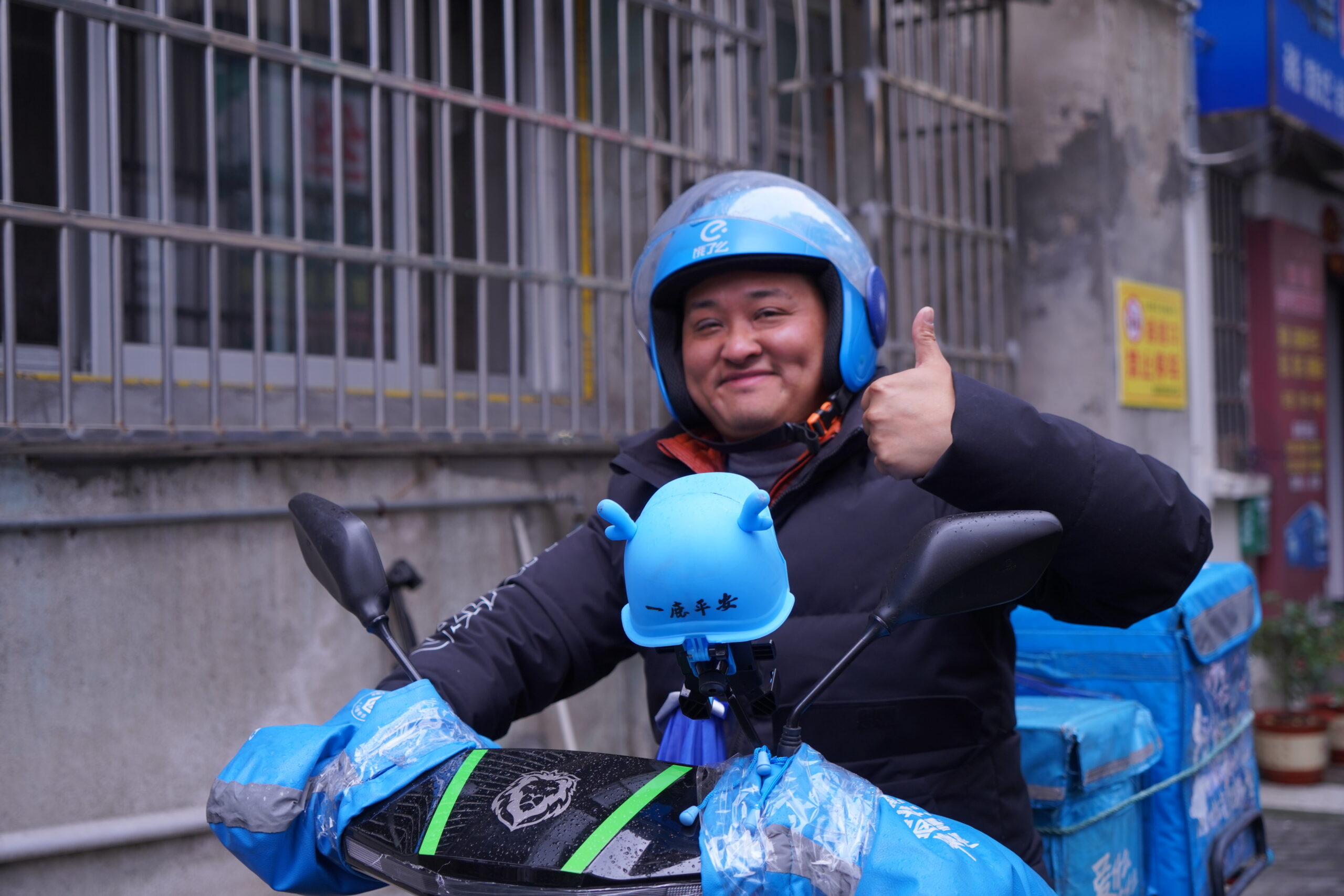
Sometimes, he prepares by turning on the camera, ready to drop off, snapping a photo, sending it, and leaving. It takes a few seconds and an order is completed. Sometimes, as he hurries to the door, the customer is already waiting. Therefore, he just needs to hand over the delivery and leave, which saves his delivery time.
Li enjoys these face-to-face deliveries as he always receives a smile or a compliment from the customer. For him, it’s a spiritual encouragement and motivation.
“He comes back happy,” He Guanyun, Li’s mother, said with a smile. “If the customer gives him a thumbs up after receiving the delivery, he comes back very, very happy, full of energy to continue.”
After five hours of delivery, Li drove home to take a break. This was his only time for rest and meals during the day. He always lies down to rest for an hour before having dinner with his family.
At five o’clock, he put on his scarf and helmet, ready to continue his evening deliveries.
Sometimes, he prepares by turning on the camera, ready to drop off, snapping a photo, sending it, and leaving. It takes a few seconds and an order is completed. Sometimes, as he hurries to the door, the customer is already waiting. Therefore, he just needs to hand over the delivery and leave, which saves his delivery time.
Li enjoys these face-to-face deliveries as he always receives a smile or a compliment from the customer. For him, it’s a spiritual encouragement and motivation.
“He comes back happy,” He Guanyun, Li’s mother, said with a smile. “If the customer gives him a thumbs up after receiving the delivery, he comes back very, very happy, full of energy to continue.”
After five hours of delivery, Li drove home to take a break. This was his only time for rest and meals during the day. He always lies down to rest for an hour before having dinner with his family.
At five o’clock, he put on his scarf and helmet, ready to continue his evening deliveries.
Part 2
A challenging dayEvery morning at 10 a.m., he would wait for orders at Jinjiadun, one of the busiest areas for food delivery in Fuyang District, Hangzhou. The location also housed battery exchange stations for delivery electric bikes. Apart from him, a considerable number of delivery drivers would choose this spot to kick off their day’s work. By noon, they would gather here to recharge batteries, take a break, chat, and grab a meal.
On this particular day, it was raining. Having checked the weather forecast the night before, he had already prepared his electric bike with a rain cover. For food delivery drivers, rainy days mean more complicated traffic conditions, and for the hearing or speech-impaired, it could be even more dangerous.
As a crowd-sourced driver, Chen could go online to take orders at any time, enjoying greater freedom in scheduling. At 10 a.m., Chen, as usual, arrived at Jinjiadun. His friend, another speech-impaired rider, was also there. They helped each other put on helmets, prepared their gear, and exchanged a few signs in sign language about daily life. Chen kept an eye on his phone, constantly switching between the WeChat and Meituan order pages.
As they set off, the rain gradually intensified, beating down on the rain cover and blurring Chen’s vision. However, he could hear loud noises like raindrops hitting the cover or honking behind him, but small sounds went unnoticed. For Chen, everything was in semi-silence.
People usually rely on sound to assess danger, but for the hearing impaired, visual cues are paramount.
His speed slowed down, and the rearview mirror became his only warning tool. With one hand on the handlebars and the other scrolling through his phone interface, he kept a close watch on order statuses and time. This was undoubtedly risky behavior, but for deaf drivers who can’t hear the system’s voice announcements of “New order received” or “Your order has been canceled,” constant checking of their phone was a necessity.
Meituan has yet to display a label on the delivery page indicating “Being delivered by a hearing or speech-impaired driver.” Customer unawareness translates to unknowns for deaf drivers. For Chen, the challenges had only just begun.
Inside a residential building, Chen pointed to the “Enter pickup code” page on his phone screen. He could only make some sounds to remind the customer:”What’s the pickup code?” Sometimes, customers need to input pickup codes for delivery, and in this case, it wasn’t the customer herself who received the delivery, but her husband.
Unfortunately, he didn’t know the pickup code either, so Chen gestured to make a phone call. However, the call to inquire about the pickup code went unanswered, and the customer’s family member also tried calling, but received no response. The husband suggested Chen leave his phone number for them to call back once they knew the code. Chen could only anxiously decline this option with a wave of his hand, feeling stuck as time ticked away. He continued to show the customer’s contact number on the phone screen and dial it, but the customer thought it was Chen’s own number and started jotting it down.
Both parties were in a state of confusion and anxiety.
Every morning at 10 a.m., he would wait for orders at Jinjiadun, one of the busiest areas for food delivery in Fuyang District, Hangzhou. The location also housed battery exchange stations for delivery electric bikes. Apart from him, a considerable number of delivery drivers would choose this spot to kick off their day’s work. By noon, they would gather here to recharge batteries, take a break, chat, and grab a meal.
On this particular day, it was raining. Having checked the weather forecast the night before, he had already prepared his electric bike with a rain cover. For food delivery drivers, rainy days mean more complicated traffic conditions, and for the hearing or speech-impaired, it could be even more dangerous.
As a crowd-sourced driver, Chen could go online to take orders at any time, enjoying greater freedom in scheduling. At 10 a.m., Chen, as usual, arrived at Jinjiadun. His friend, another speech-impaired rider, was also there. They helped each other put on helmets, prepared their gear, and exchanged a few signs in sign language about daily life. Chen kept an eye on his phone, constantly switching between the WeChat and Meituan order pages.
As they set off, the rain gradually intensified, beating down on the rain cover and blurring Chen’s vision. However, he could hear loud noises like raindrops hitting the cover or honking behind him, but small sounds went unnoticed. For Chen, everything was in semi-silence.
People usually rely on sound to assess danger, but for the hearing impaired, visual cues are paramount.
His speed slowed down, and the rearview mirror became his only warning tool. With one hand on the handlebars and the other scrolling through his phone interface, he kept a close watch on order statuses and time. This was undoubtedly risky behavior, but for deaf drivers who can’t hear the system’s voice announcements of “New order received” or “Your order has been canceled,” constant checking of their phone was a necessity.
Meituan has yet to display a label on the delivery page indicating “Being delivered by a hearing or speech-impaired driver.” Customer unawareness translates to unknowns for deaf drivers. For Chen, the challenges had only just begun.
Inside a residential building, Chen pointed to the “Enter pickup code” page on his phone screen. He could only make some sounds to remind the customer:”What’s the pickup code?” Sometimes, customers need to input pickup codes for delivery, and in this case, it wasn’t the customer herself who received the delivery, but her husband.
Unfortunately, he didn’t know the pickup code either, so Chen gestured to make a phone call. However, the call to inquire about the pickup code went unanswered, and the customer’s family member also tried calling, but received no response. The husband suggested Chen leave his phone number for them to call back once they knew the code. Chen could only anxiously decline this option with a wave of his hand, feeling stuck as time ticked away. He continued to show the customer’s contact number on the phone screen and dial it, but the customer thought it was Chen’s own number and started jotting it down.
Both parties were in a state of confusion and anxiety.
Inside a large office building, he held items to be delivered, looked around, but didn’t see the person waiting to pick up the delivery. He waited anxiously. Despite sending two pickup messages through the platform, they went unnoticed, and there was no place to leave the items in this building.
He could only call the customer, but Chen’s phone didn’t have AI voice calls, so he had to rely on passersby in such situations. They had their own set of rules for judging who to ask for help when facing difficulties and were less likely to be rejected. Chen gestured to stop a young man with a work badge who passed by, showed him the phone screen displaying the phone number, pointed to it, and without many gestures, the passerby quickly understood his meaning and helped dial the number. “The delivery is at the entrance elevator here. The delivery man is speech-impaired,” the man said on the phone.
Inside a large office building, he held items to be delivered, looked around, but didn’t see the person waiting to pick up the delivery. He waited anxiously. Despite sending two pickup messages through the platform, they went unnoticed, and there was no place to leave the items in this building.
He could only call the customer, but Chen’s phone didn’t have AI voice calls, so he had to rely on passersby in such situations. They had their own set of rules for judging who to ask for help when facing difficulties and were less likely to be rejected. Chen gestured to stop a young man with a work badge who passed by, showed him the phone screen displaying the phone number, pointed to it, and without many gestures, the passerby quickly understood his meaning and helped dial the number. “The delivery is at the entrance elevator here. The delivery man is speech-impaired,” the man said on the phone.
By noon, Chen had finished his day’s deliveries. The rain was heavy, and he felt it was too dangerous to continue.
His parents had just arrived from their hometown in Hangzhou to visit him. He planned to take the next few days off to spend time with them and enjoy themselves. His WeChat status read, “Loving our family is happiness and joy.”
By noon, Chen had finished his day’s deliveries. The rain was heavy, and he felt it was too dangerous to continue.
His parents had just arrived from their hometown in Hangzhou to visit him. He planned to take the next few days off to spend time with them and enjoy themselves. His WeChat status read, “Loving our family is happiness and joy.”
Part 3
Two Different SystemsFor those riders who haven’t been labeled in the system as hearing or speech-impaired, they might face a dual challenge of speechlessness.
For those riders who haven’t been labeled in the system as hearing or speech-impaired, they might face a dual challenge of speechlessness.
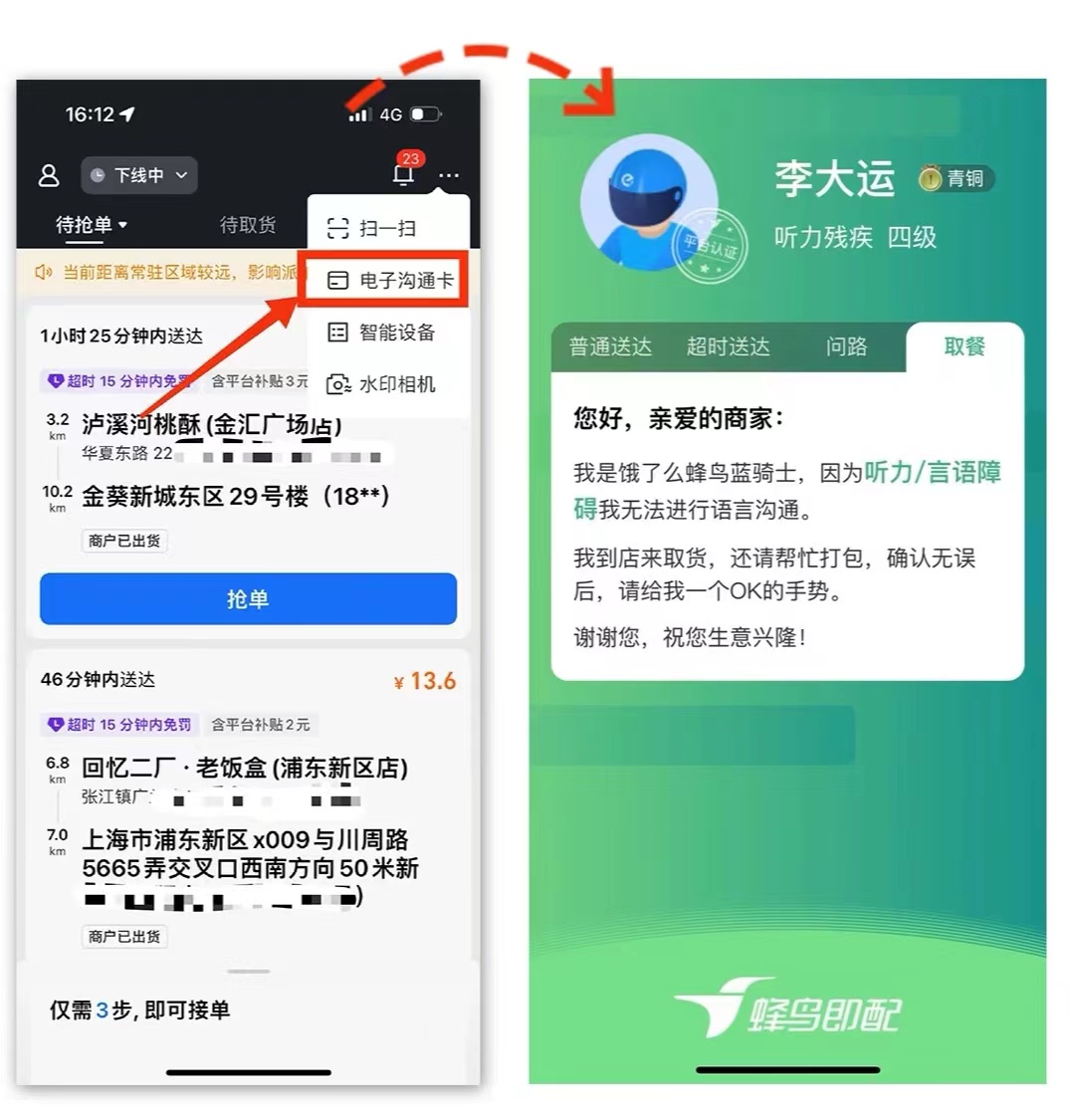

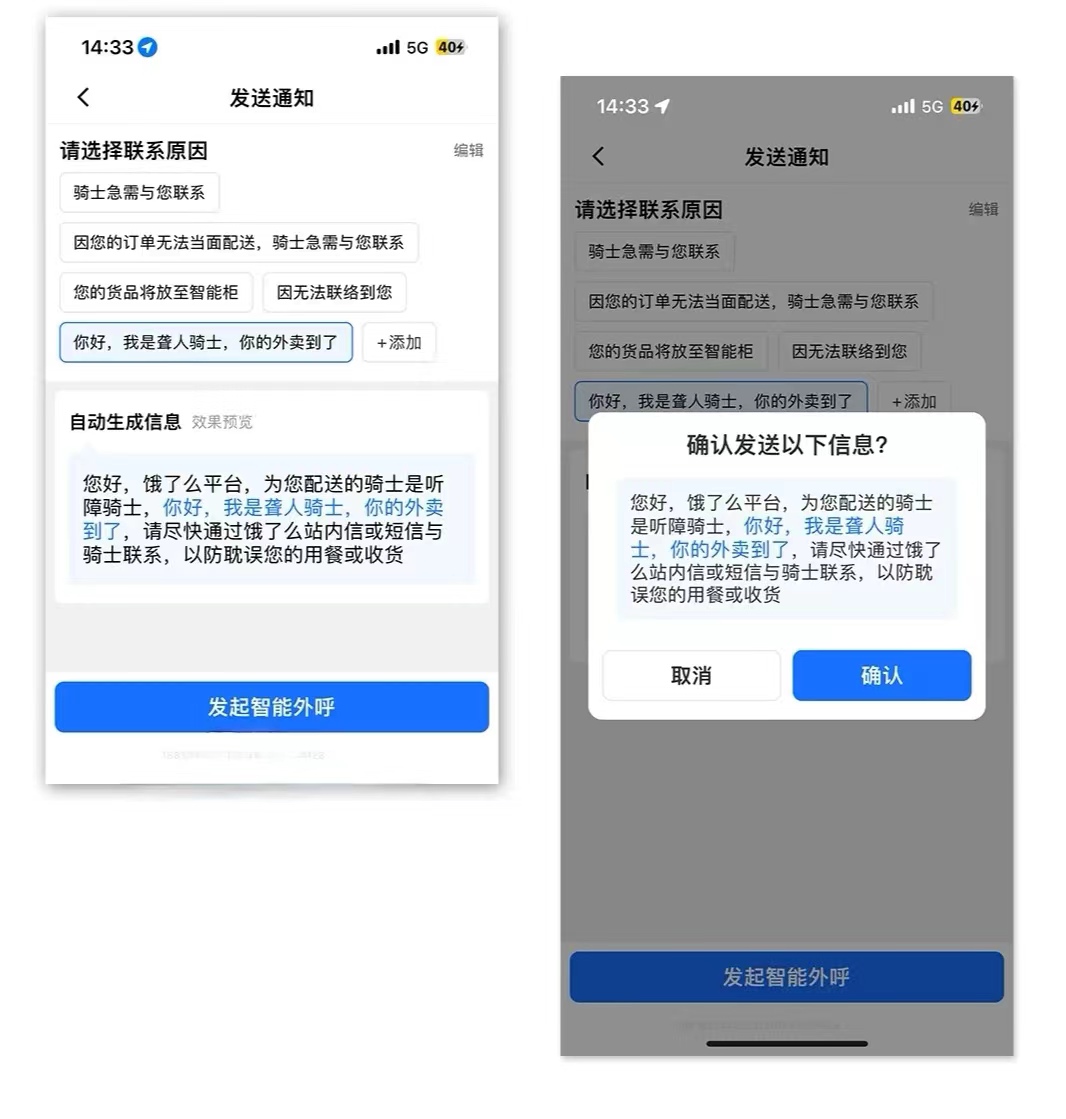

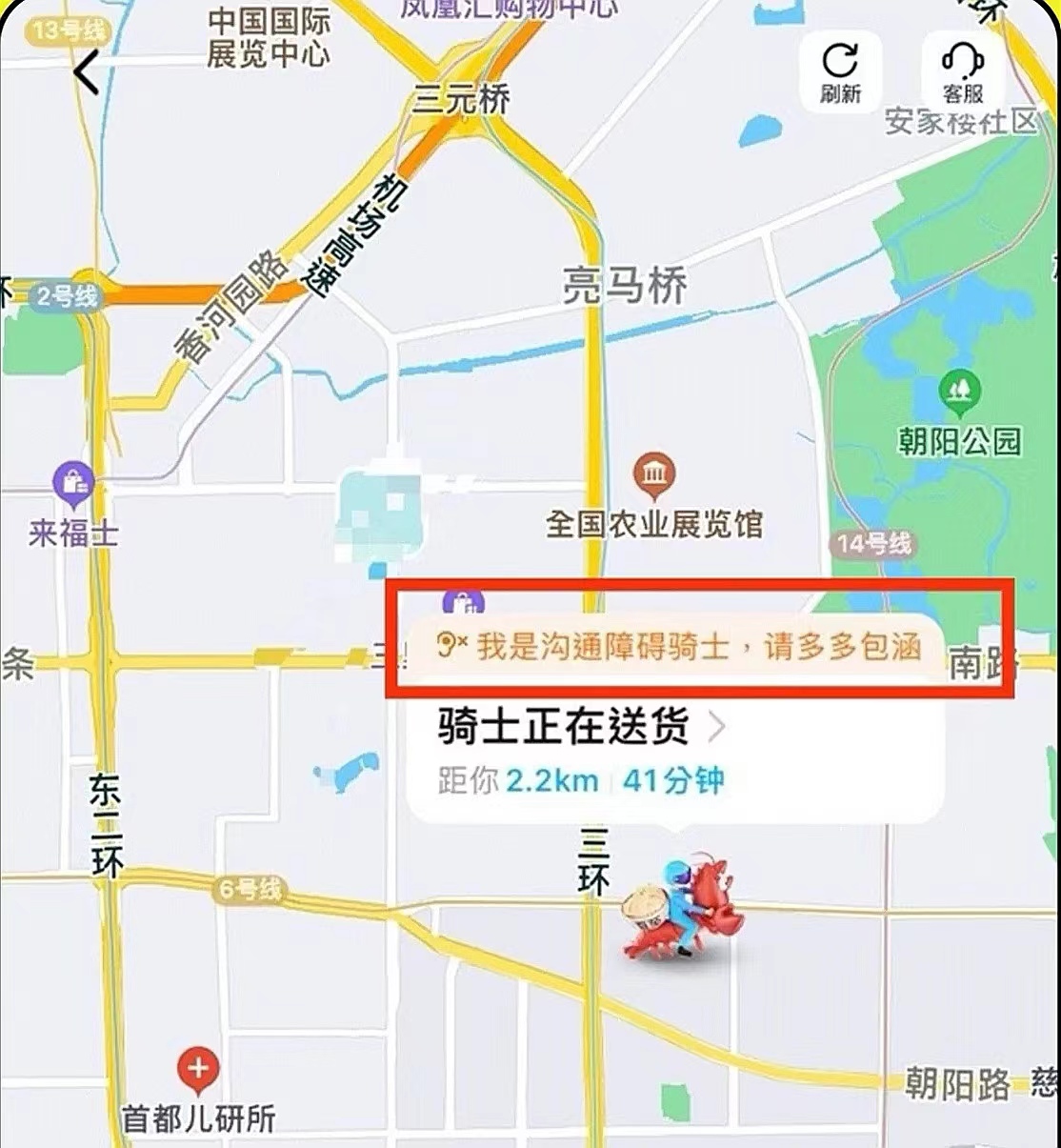

With more order volumes, Meituan has attracted many speech-impaired riders. Meituan also introduced the Electronic Communication Card and smart call-out features in 2022.
However, Meituan doesn’t have a feature like Ele.me where riders with hearing or speech impairments are identified on the delivery map interface. This also means that customers cannot know in advance if the delivery person has hearing or speech impairments.
Ele.me’s management of its riders is more meticulous. Whether it’s crowd-sourced or specialized delivery, Ele.me has designated personnel responsible for all types of riders. However, this is not the case with Meituan. In the process of implementing the “Rider QR Code” in communities in Fuyang District, Hangzhou, it was difficult to find a person responsible for Meituan’s crowd-sourced riders.
With more order volumes, Meituan has attracted many speech-impaired riders. Meituan also introduced the Electronic Communication Card and smart call-out features in 2022.
However, Meituan doesn’t have a feature like Ele.me where riders with hearing or speech impairments are identified on the delivery map interface. This also means that customers cannot know in advance if the delivery person has hearing or speech impairments.
Ele.me’s management of its riders is more meticulous. Whether it’s crowd-sourced or specialized delivery, Ele.me has designated personnel responsible for all types of riders. However, this is not the case with Meituan. In the process of implementing the “Rider QR Code” in communities in Fuyang District, Hangzhou, it was difficult to find a person responsible for Meituan’s crowd-sourced riders.
On social media platforms, there have been widespread calls for Meituan to quickly label hearing and speech-impaired riders. Customers often complain about such situations. One user posted that her delivery address was remote, and the Meituan delivery rider was speech-impaired. Both sides struggled to communicate and find each other, resulting in an hour-long ordeal to receive the delivery. The customer stated that if Meituan had labeled the rider in advance, she would have gone out earlier to wait for the delivery rider.
On social media platforms, there have been widespread calls for Meituan to quickly label hearing and speech-impaired riders. Customers often complain about such situations. One user posted that her delivery address was remote, and the Meituan delivery rider was speech-impaired. Both sides struggled to communicate and find each other, resulting in an hour-long ordeal to receive the delivery. The customer stated that if Meituan had labeled the rider in advance, she would have gone out earlier to wait for the delivery rider.
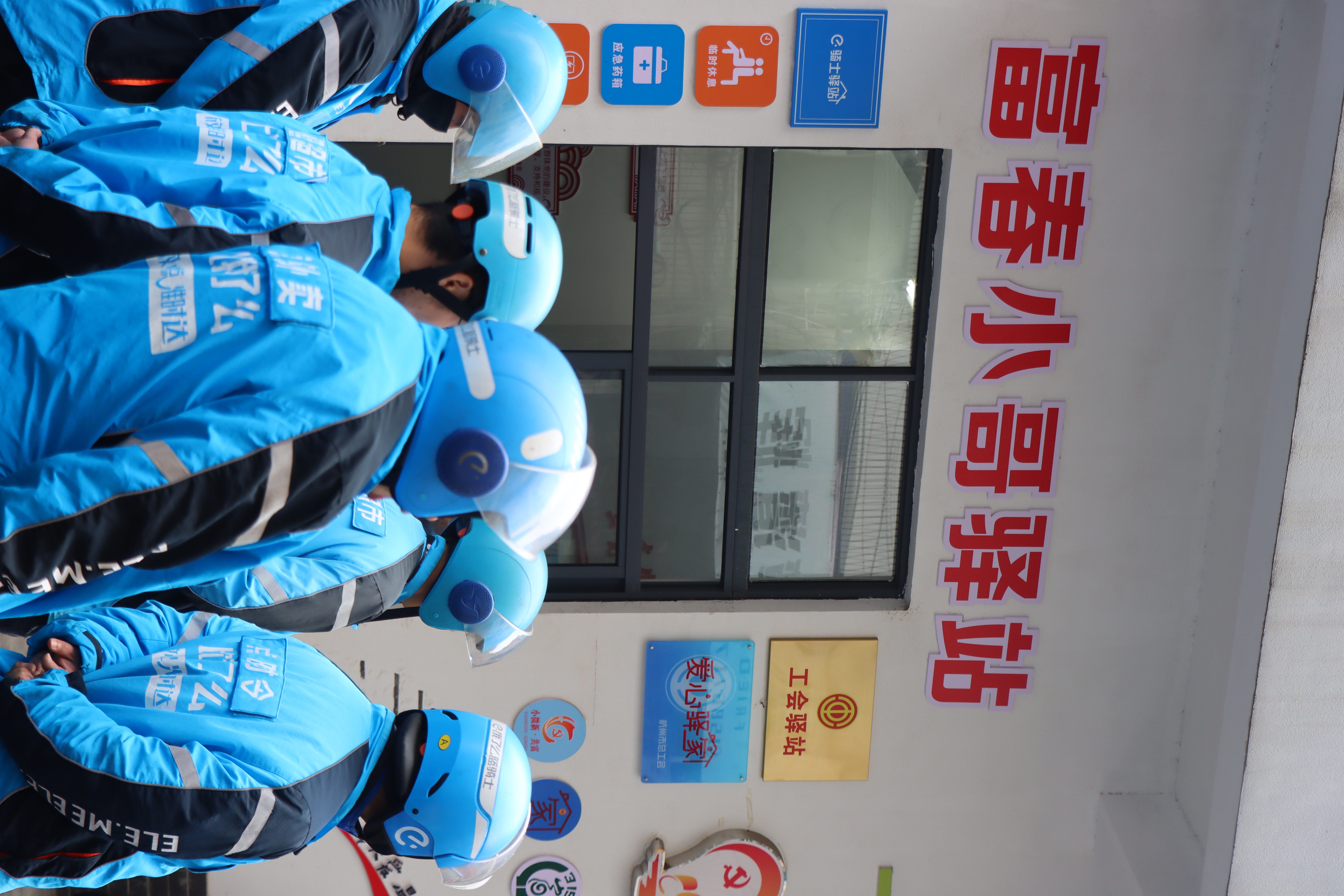
The early challenges encountered by deaf riders in delivering orders were significant. They were unable to enter communities, the customer’s location was inaccurate, navigation couldn’t find the merchant, or when they drove slowly due to rain or snow, they couldn’t communicate with customers or merchants to navigate the situation without making phone calls, leading to frustration.
However, compared to a few years ago when food delivery platforms relied solely on typed communication, the current designs are undoubtedly more user-friendly.
The early challenges encountered by deaf riders in delivering orders were significant. They were unable to enter communities, the customer’s location was inaccurate, navigation couldn’t find the merchant, or when they drove slowly due to rain or snow, they couldn’t communicate with customers or merchants to navigate the situation without making phone calls, leading to frustration.
However, compared to a few years ago when food delivery platforms relied solely on typed communication, the current designs are undoubtedly more user-friendly.
Part 4
"I Earn a Living Myself"He switched to working at a paper mill. The job at the paper mill only paid around 2,000 to 3,000 yuan a month. Li Pingfeng mentioned that he could hardly afford to indulge in good food and lived a very frugal life.
However, after becoming a delivery rider, he earned much more than before. “I earn a living myself, and I tried my best” , he wrote on his makeshift notepad. The freedom of zooming around the city on his electric bike appealed to him.
He switched to working at a paper mill. The job at the paper mill only paid around 2,000 to 3,000 yuan a month. Li Pingfeng mentioned that he could hardly afford to indulge in good food and lived a very frugal life.
However, after becoming a delivery rider, he earned much more than before. “I earn a living myself, and I tried my best” , he wrote on his makeshift notepad. The freedom of zooming around the city on his electric bike appealed to him.

For those born deaf, communication flows through sign language. Polite gestures like “please” or “thank you” don’t have direct equivalents. So when typing, they might reply with short or slightly confusing messages, occasionally leading to misunderstandings or complaints from customers.
But for them, delivery offers a relatively accessible and flexible job opportunity with decent pay. All you need is an electric bike and knowledge of the area, and you’re good to go. Deliveries nowadays often involve minimal interaction, with packages left at the door or in designated drop-off spots without needing to speak to anyone.
However, becoming a specialized delivery rider presents challenges. Many deaf riders opt for being crowd-sourced drivers, which offers less contact with the platform but also fewer protections.
Still, being able to earn a living and support oneself solely through personal effort imbues them with a profound sense of accomplishment.
For those born deaf, communication flows through sign language. Polite gestures like “please” or “thank you” don’t have direct equivalents. So when typing, they might reply with short or slightly confusing messages, occasionally leading to misunderstandings or complaints from customers.
But for them, delivery offers a relatively accessible and flexible job opportunity with decent pay. All you need is an electric bike and knowledge of the area, and you’re good to go. Deliveries nowadays often involve minimal interaction, with packages left at the door or in designated drop-off spots without needing to speak to anyone.
However, becoming a specialized delivery rider presents challenges. Many deaf riders opt for being crowd-sourced drivers, which offers less contact with the platform but also fewer protections.
Still, being able to earn a living and support oneself solely through personal effort imbues them with a profound sense of accomplishment.
Part 5
Measures OngoingAt the outset of his career in delivery services, an order lacking a precise address or requiring phone contact was his “nightmare” “I can’t communicate with the customer over the phone, and texting isn’t timely enough, which may lead me to be fined,” Li wrote.
At the outset of his career in delivery services, an order lacking a precise address or requiring phone contact was his “nightmare” “I can’t communicate with the customer over the phone, and texting isn’t timely enough, which may lead me to be fined,” Li wrote.
However, intelligent voice assistants are passive skills triggered by deaf drivers when they must answer calls. Their speed in using strokes or handwritten text input is not swift, and forgetting a character’s writing method can also prolong the input time.
They cannot guarantee how long customers can endure silence during a real-time call.
In front of a residential area, Li scanned the code and showed it to the security guard. After that, he smoothly entered the area on his electric bike.
However, intelligent voice assistants are passive skills triggered by deaf drivers when they must answer calls. Their speed in using strokes or handwritten text input is not swift, and forgetting a character’s writing method can also prolong the input time.
They cannot guarantee how long customers can endure silence during a real-time call.
In front of a residential area, Li scanned the code and showed it to the security guard. After that, he smoothly entered the area on his electric bike.
“Some guards won’t let the delivery drivers in, so I can only send text messages, and some people are unwilling to come down,” wrote Fu Bo, also a deaf delivery driver for the Ele.me platform.
Poor communication leads to a chain of misunderstandings. Security guards don’t understand why they have to enter the residential area to deliver food, and customers don’t know why their food can’t be delivered to their doorstep. This can result in late or even canceled orders.
Now, the situation of “difficult entry into communities” has improved somewhat.
In January 2023, the Fuyang District Market Supervision Administration of Hangzhou pioneered and launched the “Fuchun Xiaoge Code,” a pass allowing delivery drivers to enter residential areas by electric bikes. Although not designed for deaf delivery drivers, the Xiaoge Code has helped them overcome an obstacle on their way to delivery. After showing the real-time Xiaoge Code to the guard, deaf delivery drivers no longer need to spend time typing and communicating with them.
“Some guards won’t let the delivery drivers in, so I can only send text messages, and some people are unwilling to come down,” wrote Fu Bo, also a deaf delivery driver for the Ele.me platform.
Poor communication leads to a chain of misunderstandings. Security guards don’t understand why they have to enter the residential area to deliver food, and customers don’t know why their food can’t be delivered to their doorstep. This can result in late or even canceled orders.
Now, the situation of “difficult entry into communities” has improved somewhat.
In January 2023, the Fuyang District Market Supervision Administration of Hangzhou pioneered and launched the “Fuchun Xiaoge Code,” a pass allowing delivery drivers to enter residential areas by electric bikes. Although not designed for deaf delivery drivers, the Xiaoge Code has helped them overcome an obstacle on their way to delivery. After showing the real-time Xiaoge Code to the guard, deaf delivery drivers no longer need to spend time typing and communicating with them.

However, due to the platform’s failure to allocate management personnel, Meituan’s crowd-sourced drivers were previously unable to use the Xiaoge code for deliveries. The demands of one-seventh of the drivers were addressed after the platform recently converted some team leaders to administrators, but over half of Meituan’s deaf drivers still haven’t been assigned codes.
Considering the practical difficulties they faced, the government temporarily entrusted them to other administrators and approved their code assignment applications.
However, due to the platform’s failure to allocate management personnel, Meituan’s crowd-sourced drivers were previously unable to use the Xiaoge code for deliveries. The demands of one-seventh of the drivers were addressed after the platform recently converted some team leaders to administrators, but over half of Meituan’s deaf drivers still haven’t been assigned codes.
Considering the practical difficulties they faced, the government temporarily entrusted them to other administrators and approved their code assignment applications.
AAA
Part 6Even before Qiu Lianke established the deaf delivery driver group for them, the seven deaf drivers in Fuyang District had already connected.
This group not only served as a place for casual conversation but also functioned as a workforce coordination hub in case of unexpected situations. Whether it was running out of battery power for their electric bikes or accidentally taking a tumble, as long as a call for help was posted in the group, other deaf drivers would step in to take over the deliveries.
Without any deliberate guidance from a third party, their mutual assistance resembled the unspoken understanding found among old friends.
Even before Qiu Lianke established the deaf delivery driver group for them, the seven deaf drivers in Fuyang District had already connected.
This group not only served as a place for casual conversation but also functioned as a workforce coordination hub in case of unexpected situations. Whether it was running out of battery power for their electric bikes or accidentally taking a tumble, as long as a call for help was posted in the group, other deaf drivers would step in to take over the deliveries.
Without any deliberate guidance from a third party, their mutual assistance resembled the unspoken understanding found among old friends.
Every station of Ele.me has its honor roll, where delivery drivers are ranked based on the number of orders completed or their ratings for the day. Checking the honor roll gives Li a sense of achievement. He treats delivering food as a connection to society and a source of passion.
“He loves it,” his mother He said. “My son is an outgoing person. He just likes to run around, and this job suits him.”
In the world of silent deliveries, Li’s enthusiasm speaks volumes. He would change his WeChat name to “Loyal Knight” (Knight is the appellation given to delivery drivers by Ele.me.) and share his delivery life on social media platforms. As someone who often tops the list for the number of orders completed, he is referred to as the “King of Orders” by other drivers. For him, the identity of a delivery driver has become a precious part of his life.
Every station of Ele.me has its honor roll, where delivery drivers are ranked based on the number of orders completed or their ratings for the day. Checking the honor roll gives Li a sense of achievement. He treats delivering food as a connection to society and a source of passion.
“He loves it,” his mother He said. “My son is an outgoing person. He just likes to run around, and this job suits him.”
In the world of silent deliveries, Li’s enthusiasm speaks volumes. He would change his WeChat name to “Loyal Knight” (Knight is the appellation given to delivery drivers by Ele.me.) and share his delivery life on social media platforms. As someone who often tops the list for the number of orders completed, he is referred to as the “King of Orders” by other drivers. For him, the identity of a delivery driver has become a precious part of his life.
Not just for him, the idea of independence seems to have roots in the hearts of every deaf delivery driver we encountered. Unable to hear, they may receive more love and care, but their desire for independence is no less than anyone else’s.
The limited opportunities available to them make the occupation of the delivery driver a chance for independence. Under the principle of “the more you work, the more you earn,” delivery drivers are more focused and diligent than regular delivery drivers and willing to extend their working hours to complete more orders.
“I strive to give my wife a good life,” Li wrote on his writing pad.
But he understands that to achieve this dream, he still has a long way to go on his silent delivery journeys.
Advisor: Foon Lee, Cindy Sui
Not just for him, the idea of independence seems to have roots in the hearts of every deaf delivery driver we encountered. Unable to hear, they may receive more love and care, but their desire for independence is no less than anyone else’s.
The limited opportunities available to them make the occupation of the delivery driver a chance for independence. Under the principle of “the more you work, the more you earn,” delivery drivers are more focused and diligent than regular delivery drivers and willing to extend their working hours to complete more orders.
“I strive to give my wife a good life,” Li wrote on his writing pad.
But he understands that to achieve this dream, he still has a long way to go on his silent delivery journeys.
Advisor: Foon Lee, Cindy Sui
Credits
Produced by
Sun Yuheng & Tang Shanshan
Thanks to
Li Pingfeng and his family members
Cheng Shihong
Qiu Lianke
All deaf delivery drivers in Fuyang, Hangzhou
Fuyang District Market Supervision Administration
